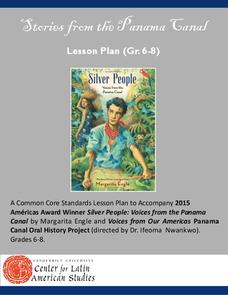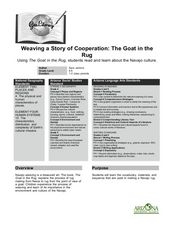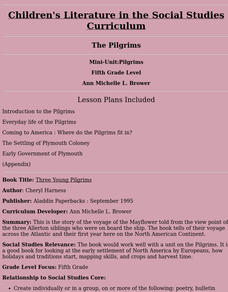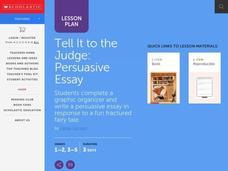Curated OER
Lesson Five: Introduction to Auxiliary Verbs
If you are interested, you could try out this lesson on auxiliary verbs. Class members get the chance to discuss the difference between can and could in-depth before viewing a presentation that breaks down several auxiliary verbs. After...
Vanderbilt University
Stories from the Panama Canal
The stories of the Silver People, the West Indies immigrants hired to work on the Panama Canal, come to life in a lesson about the building of the Panama Canal. Groups research why the canal was built, how it was build, the working...
J. Paul Getty Trust
Exhibiting Common Threads
Artists working in different media often explore the same themes—to model how these same themes weave their way through different forms of artistic expression, scholars analyze images by Dorothea Lange, identifying key themes in her...
Wiley Publishing
Anatomy and Physiology Workbook
Peruse a workbook for every system in the human body. From cellular makeup to the integumentary system to human reproduction, the 300-page workbook features informative reading passages, guided practice, and humorous comic strips to get...
EngageNY
Studying Conflicting Information: Varying Perspectives on the Pearl Harbor Attack, Part 2
Scholars take another look at Japan's Fourteen-Part Message. They then take turns adding ideas to sentence starters to create ideas about the different perspectives of government. To finish, groups mix and mingle to share their sentences...
Appalachian State University
Making Your Point Using Dialect
Explore the sounds, importance, and effectiveness of dialect in literature. Active participants read, listen to poetry, and explore dialect by developing a formal definition, discuss the benefits of its use, complete a Venn diagram...
Southern Nevada Regional Professional Development Program
Reading Literature - An Occurrence at Owl Creek Bridge
“An Occurrence at Owl Creek Bridge,” Ambrose Bierce’s short story, is used to model how structural moves, the decisions an author makes about setting, point of view, time order, etc., can be examined to reveal an author’s purpose. Groups...
Curated OER
Friar Margil and the Spanish Missions
Students examine the concepts of diversity and assimilation. They identify the validity of sources and recognize bias, and create original illustrations from the students' point of view which show the impact of the Spanish friars on the...
Curated OER
A View of Yourself Through Famous Writers
Students research famous quotes and discover one that describes themselves. They consider topics such as family and hobbies that will help others understand them. They present their information to the class.
Curated OER
In God We Trust; All Others Pay Cash
Learners review their knowledge on the First Amendment. After reading an article, they identify specific church and state issues. Using the Internet, they research President Bush's proposal from a specific point of view. They summarize...
Los Angeles Unified School District
Capitalism and Socialism
Capitalism, socialism, communism ... these may seem like a whole bunch of isms to your scholars. High schoolers won't confuse them after completing an informative resource. Your class masters how to use primary sources to...
Dream of a Nation
Writing a Narrative Essay
Imagine using narrative essays to encourage change. This multi-week unit plan does just that. After reading a series of articles from Tyson Miller's Dream of a Nation: Inspiring Ideas for a Better America, class members examine the...
Curated OER
Esperanza Rising - Literature Circles and Review (Day 3)
Kids love working with their peers. Get your class into small literature circles and have them complete weekly assignments. Before beginning this week's activity, have each learner write a letter from Esperanza in California to Abuelita...
Curated OER
Weaving a Story of Cooperation: The Goat in the Rug
Weaving is an important part of Navajo culture. Read The Goat in the Rug to your fourth and fifth graders, and give them a glimpse into the process of rug making from the point of view of a goat! They will learn new vocabulary words and...
Curated OER
The Colonization of the United States
Bring the Age of Exploration into the 21st century with this ancestry activity! Learners get a chance to explore the complex genealogy of the Spanish settlers through watching two video clips (approximately five minutes each) featuring...
Curated OER
Where the Red Fern Grows Chapter 1 Worksheet
Break down Where the Red Fern Grows by Wilson Rawls into manageable chunks by focusing on plot points and literary elements in specific chapters. This resource is all about the first chapter, and asks pupils to use complete sentences to...
Curated OER
Children's Media and Censorship
High schoolers form opinions about children and television censorship after analyzing literature. They complete a journal writing activity to identify the topic and make a list of inappropriate television shows for children. Next, they...
Curated OER
Three Young Pilgrims
Fifth graders study the story of the voyage of the Mayflower told from the view point of the three Allerton siblings who were on board the ship. The book tells of their voyage across the Atlantic and their first year here on the North...
Digital Public Library of America
African American Soldiers in World War I
Finding good primary source materials to support any study of history can be a challenge and time-consuming. A set of 11 primary source letters, images, and text excerpts provide young historians with an opportunity to sharpen their...
Curated OER
Girders and Wrecking Ball Activity
As learners build the "girders" of conversation by staying consistent on a particular topic, they avoid the "wrecking ball" of an off-topic comment. To help students develop this important conversation skill, this resource provides...
Curated OER
Workplace Communication from Two Points of View
Students explore the significance of communication in the workplace. In this written communication lesson plan, students review and discuss the attributes of workplace memos prior to writing their own using the provided checklist.
Curated OER
Tell It to the Judge - Persuasive Essay
Students compare and contrast a classic fairy tale with a fractured one and complete a graphic organizer. Then they write a persuasive essay following the steps of the writing process. Finally, students publish their completed essay and...
Curated OER
A Wolf's Tale
Third graders are introduced to the story elements of fairy tales. As a class, they rewrite the story Little Red Riding Hood, told from the wolf's perspective. Then they create a class PowerPoint of the story, each partner group creating...
Curated OER
Focus on Figurative Language
Using the poems "First Snow" by Ted Kooser and "Eating Alone" by Yi-Young Lee (or other suggested poems by Robert Frost or Sara Teasdale), middle schoolers search for examples of figurative language. Guide your learners by discussing...
Other popular searches
- Authors Point of View
- Author's Point of View
- Author's Point of View Media
- Authors Point of View Media
- Author's "Point of View" Media























